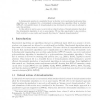2100 search results - page 86 / 420 » Fundamentals of the problem |
SIGACT
2010
13 years 8 months ago
2010
A fundamental question in complexity theory is whether every randomized polynomial time algorithm can be simulated by a deterministic polynomial time algorithm (that is, whether B...
IAT
2005
IEEE
14 years 3 months ago
2005
IEEE
Choosing when to communicate is a fundamental problem in multi-agent systems. This problem becomes particularly hard when communication is constrained and each agent has different...
ACSD
2006
IEEE
14 years 4 months ago
2006
IEEE
Recently, the formal approach of I–Systems has been newly hed through an abstract axiomatic system where events in system components are solely derived and defined from their b...
ICASSP
2007
IEEE
14 years 4 months ago
2007
IEEE
This paper considers the problem of learning cellular signaling networks from incomplete measurements of pathway activity. Cells respond to environmental changes (e.g., starvation...
GECCO
2005
Springer
14 years 3 months ago
2005
Springer
A need for solving more and more complex problems drives the Evolutionary Computation community towards advanced models of Evolutionary Algorithms. One such model is the island mo...

